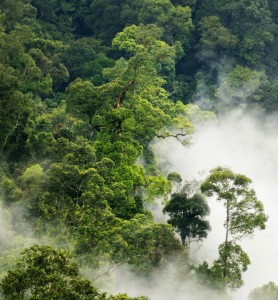There is a nice summary of Indonesia’s forest woes in this week’s Economist.
The article includes a comment from Sinar Mas, Indonesia’s single largest rainforest destroyer, reiterating Sinar Mas’ sole talking point:
Gandhi Sulistyanto, Sinar Mas’s managing director, also points to the huge economic benefits his business brings Indonesia, directly and indirectly supporting millions of people and producing more than one-tenth of Indonesia’s exports…
Sinar Mas desperately wants us to believe that conserving the environment is bad for development and by extension people. But there is a large and growing body of evidence that demonstrates keeping forests standing generates more benefits for the economy than clear cutting.
A study by a group of economists published in Ecological Economics took a detailed look at this question, using the Leuser Ecosystem, arguably Indonesia’s single largest contiguous tropical forest, as a study site.

The researchers developed three model outcomes for the Leuser Ecosystem in 2030: ‘Conservation’, ‘Deforestation’, and ‘Selective Use’. They then assigned monetary values to all the ecological services the Leuser Ecosystem provides to the 4 million people who live in or around it.
What they found is that under the ‘Deforestation’ scenario, where Leuser was logged legally and illegally at a rapid rate, the accumulated Total Economic Value of the scenario was USD 7 billion. But under the ‘Conservation’ scenario, at 2030, the Total Economic Value of Leuser was USD 9.5 billion. And this number does not account for possible future revenues derived from the carbon content stored in the trees that are left standing if the Leuser Ecosystem is left standing.
Granted, this is just one study focusing on one tropical forest in Indonesia. But the important nuance that is never acknowledged by Sinar Mas or others in the forest destruction business is that forests have real, concrete, and even measurable economic value when they are left standing.
David Gilbert is a Research Fellow at RAN. He has worked in the tropical forests of the Amazon and Indonesia, with a special focus on forest conservation and indigenous rights.
He can be reached at davidgilbert@ran.org